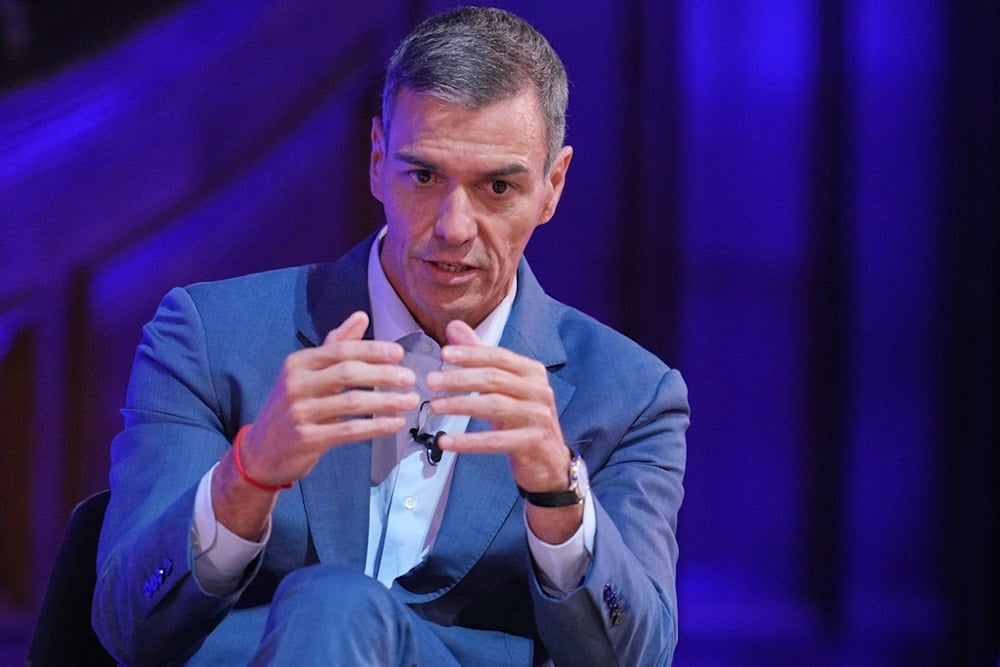Spain to maintain arms embargo on ‘Israel’ despite ceasefire
Spain will keep its arms embargo on ‘Israel’ despite the Gaza ceasefire, with PM Pedro Sanchez calling for lasting peace and a possible peacekeeping deployment.
-

Prime Minister of Spain Pedro Sánchez gestures as he speaks at the Global Progress Action Summit, in London, Friday, September 26, 2025. (AP)
Spanish Prime Minister Pedro Sanchez announced on Tuesday that Spain will maintain its arms embargo on the Israeli occupation, which was imposed over the war in Gaza, despite the recently implemented ceasefire agreement.
“The arms embargo remains in place. We have a truce now, but we still have to build peace. The opportunity has come, and we must accompany this process from Spain and Europe, with our own view on international relations and with the participation of the United Nations,” Sanchez said during an interview with Cadena SER radio.
Last week, the Spanish parliament ratified a government decree formalizing the ban on selling or importing weapons, military equipment, and related technologies to and from the Israeli occupation.
Sanchez also said that Madrid is prepared to consider deploying Spanish troops to the Gaza Strip as part of an internationally approved peacekeeping mission. He stressed that peace efforts must extend beyond Gaza to include the Israeli-occupied West Bank.
Spain passes decree formalizing 'Israel' embargo
Spain's parliament narrowly approved Thursday a sweeping decree imposing a total embargo on arms and dual-use technology to and from "Israel", marking one of the most decisive actions by a European government in response to "Israel's" ongoing genocide against Palestinians in Gaza.
The decree, passed on Wednesday, forms part of a broader sanctions package introduced last month by Sanchez's government. It halts all defense exports and imports and bars ships and aircraft carrying fuel or materials for potential military use from accessing Spanish ports and airspace, an effort to prevent any indirect participation in "Israel's" genocidal campaign.
Economy Minister Carlos Cuerpo hailed the measure as "a firm step and pioneering at an international level," while Defense Minister Margarita Robles described it as "the final step in a long process" that began immediately after the October 7 operation, stressing that Spain "stopped selling military material to Israel that very day."
Intense debate
The decree was passed after intense debate, with backing from the far-left Podemos party and several left-wing and regional allies. Podemos leader Ione Belarra, who delayed her party's position until the last moment, ultimately supported the embargo but denounced it as incomplete, calling it a "fake embargo". She accused the government of duplicity, asserting that "four ships carrying US military equipment bound for Israel" had been allowed to dock in Spanish ports despite the embargo's enforcement.
The conservative Popular Party (PP) and far-right Vox opposed the decree, claiming it would harm Spain's diplomatic relationships and "politicize foreign policy." The vote, initially scheduled for Tuesday, was postponed to avoid coinciding with the anniversary of the October 7 operation, a move condemned by "Israel's" embassy in Madrid, which labeled the timing "perverse and inhuman."
The embargo represents the centerpiece of a wider sanctions regime targeting "Israel's" atrocities in Gaza and the occupied territories. In addition to halting arms trade, the package bans imports of goods produced in illegal Israeli settlements and expands humanitarian aid to Palestine, part of Madrid's growing effort to hold "Israel" accountable for grave violations of international law.

 3 Min Read
3 Min Read









